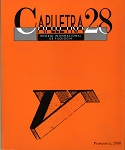El caminant de la terra: els primers llibres de viatge de Josep M. Espinàs
DOI:
https://doi.org/10.7203/caplletra.28.7582Keywords:
llibres de viatges, literatura anys cinquanta i seixanta, Camilo José Cela, Josep M. Espinàs, realisme social Abstract
Abstract
Resum: Travel books have outstanding protagonism in the Spanish literature of the 1950s and 60s because of their aptness for the prevailing objective that “reality must be told”. The influence of C. J. Cela’ s model and the special conception of the genre in Flistorical Realism constitute the two main axes on which the production develops. José M. Espinás’ first two books, «Viatge al Pirineu de Lleida» («Journey to the Pyrenees of Lleida», 1957) i «Viatge al Priorat» («Journey to the Priorat», 1962), are placed within this reference frame: the former is in the line opened up by Cela with his «Viaje a la Alcarria» («Journey to the Alcarria»), and the latter is closer to the interest for social and economic realism as defended by Social Realism, although without its charactersitc critical intentionality.Paraules clau: llibres de viatges; literatura anys cinquanta i seixanta; Camilo José Cela; Josep M. Espinàs; realisme social
 Downloads
Downloads
Downloads
How to Cite
-
Abstract272
-
PDF (Català)161
Issue
Section
License
Authors submitting work to Caplletra for publication must be the legitimate holder of the usage rights. Legitimacy for the purposes of publishing the work must also include images, tables, diagrams and any other materials that may complement the text, whether they are the author of such material or not.
Copyright: on publishing their work in the journal, the author grants Caplletra. Revista Internacional de Filologia usage rights (reproduction, distribution and public communication) for both the paper printed version and for the electronic version.
All work published in Caplletra is covered by the Creative Commons license type Attribution-NonCommercial-NoDerivatives 4.0 (CC BY-NC-ND 4.0).
RESPONSABILITY
Caplletra. Revista Internacional de Filologia does not necessarily identify with the points of view expressed in the papers it publishes.
Caplletra. Revista Internacional de Filologia accepts no responsibility whatsoever for any eventual infringement of intellectual property rights on the part of authors.






